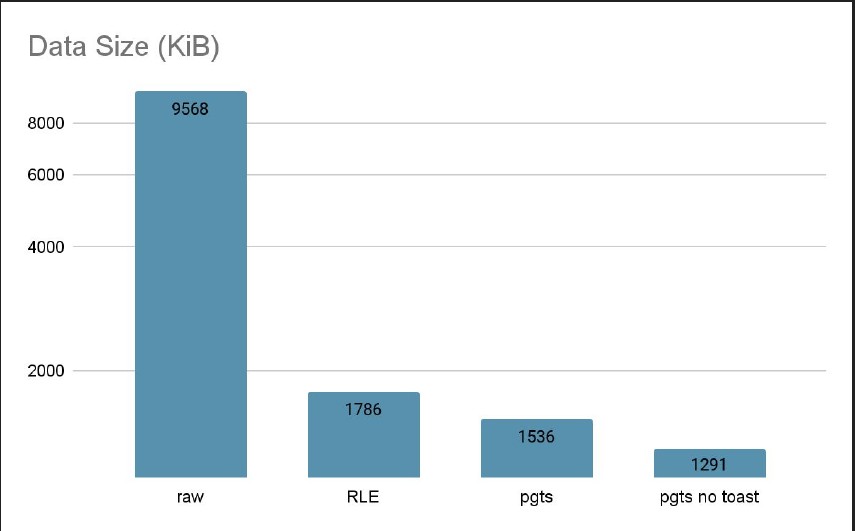Archive your time series in PostgreSQL as a professional.
This project is a set of encoders, currently pgts has the double-delta encoding and a warpper for zstd compression
Unlike to other time series database, pgts does not provides a complete storage engine, but it can be embedded to any database which support User Defined Function. pgts is committed to providing a quick demo environment to demonstrate the power of time series coding.
There are only two API in pgts, it is very simle.
ts.u8_encode(array[/* 64bit integer array */]); -- d = zstd(DeltaOfDelta(raw data))
ts.u8_decode(/* bytes from ts_u8_enode */); -- decompress the data from encode()For more implementation details please see the hackday slide
example: there is a table like this:
CREATE TABLE gpmetrics.gpcc_system_history (
ctime timestamp(0) without time zone,
hostname character varying(64),
mem_total bigint,
mem_used bigint,
mem_actual_used bigint,
mem_actual_free bigint,
swap_total bigint,
swap_used bigint,
swap_page_in bigint,
swap_page_out bigint,
cpu_user double precision,
cpu_sys double precision,
cpu_idle double precision,
load0 double precision,
load1 double precision,
load2 double precision,
quantum integer,
disk_ro_rate bigint,
disk_wo_rate bigint,
disk_rb_rate bigint,
disk_wb_rate bigint,
net_rp_rate bigint,
net_wp_rate bigint,
net_rb_rate bigint,
net_wb_rate bigint,
cpu_iowait double precision DEFAULT 0
)use this SQL to archive the data
create table x as
select
hostname,
ts.timestamp_encode( array_agg( ctime order by ctime) ) as ctime,
ts.u8_encode( array_agg( mem_total order by ctime) ) as mem_total,
ts.u8_encode( array_agg( mem_used order by ctime) ) as mem_used,
ts.u8_encode( array_agg( mem_actual_used order by ctime) ) as mem_actual_used,
ts.u8_encode( array_agg( mem_actual_free order by ctime) ) as mem_actual_free,
ts.u8_encode( array_agg( swap_total order by ctime) ) as swap_total,
ts.u8_encode( array_agg( swap_used order by ctime) ) as swap_used,
ts.u8_encode( array_agg( swap_page_in order by ctime) ) as swap_page_in,
ts.u8_encode( array_agg( swap_page_out order by ctime) ) as swap_page_out,
ts.u8_encode( array_agg( (cpu_user*100000)::bigint order by ctime) ) as cpu_user,
ts.u8_encode( array_agg( (cpu_sys*100000)::bigint order by ctime) ) as cpu_sys,
ts.u8_encode( array_agg( (cpu_idle*100000)::bigint order by ctime) ) as cpu_idle,
ts.u8_encode( array_agg( (load0*100)::bigint order by ctime) ) as load0,
ts.u8_encode( array_agg( (load1*100)::bigint order by ctime) ) as load1,
ts.u8_encode( array_agg( (load2*100)::bigint order by ctime) ) as load2,
ts.u8_encode( array_agg( quantum order by ctime) ) as quantum,
ts.u8_encode( array_agg( disk_ro_rate order by ctime) ) as disk_ro_rate,
ts.u8_encode( array_agg( disk_wo_rate order by ctime) ) as disk_wo_rate,
ts.u8_encode( array_agg( disk_rb_rate order by ctime) ) as disk_rb_rate,
ts.u8_encode( array_agg( disk_wb_rate order by ctime) ) as disk_wb_rate,
ts.u8_encode( array_agg( net_rp_rate order by ctime) ) as net_rp_rate,
ts.u8_encode( array_agg( net_wp_rate order by ctime) ) as net_wp_rate,
ts.u8_encode( array_agg( net_rb_rate order by ctime) ) as net_rb_rate,
ts.u8_encode( array_agg( net_wb_rate order by ctime) ) as net_wb_rate,
ts.u8_encode( array_agg( (cpu_iowait*100)::bigint order by ctime) ) as cpu_iowait
from notts group by hostname;and use this SQL to read the archived data.
select
hostname,
unnest( ts.timestamp_decode(ctime) ) as ctime
from
x
group by
hostname,
ctime
order by
ctime;Current project is aimed to do POC of apply time series encoding to existing data. the POC has done and shows the power of time series encoding.
But there are some features that still unimplemented, including Gorilla encoding and streaming API.
MIT.
